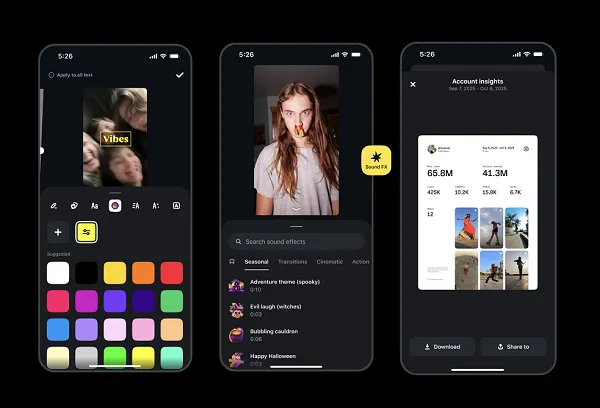
Meta is advancing its AI initiatives by officially launching its AI chatbot across the Middle East and Africa, providing users in these regions with access to Meta’s cutting-edge AI models. This strategic move aims to empower a wider audience to engage with innovative AI technology and enhance their digital experiences.
As outlined by Meta:
“We’ve officially launched Meta AI in the Middle East and North Africa with Arabic capabilities. With this new chapter in our expansion, millions of users across the region now have unlimited free access to one of the world’s most advanced AI assistants conveniently located in the apps you know and love, like Facebook, Instagram, WhatsApp, and Messenger.”
This expansion represents a significant milestone in Meta’s quest to connect the next billion users through its state-of-the-art AI tools. Meta reports an impressive increase in usage, with Meta AI now being utilized by 700 million individuals monthly, up from 400 million just last September, showcasing the growing demand and reliance on AI technologies.
Demonstrating its commitment to AI development, Meta plans to invest approximately $65 billion in infrastructure this year alone. This substantial financial commitment underlines Meta’s dedication to enhancing its AI capabilities and ensuring robust support for its expanding user base.
A notable portion of this investment, around $10 billion, will be directed towards a groundbreaking subsea cable project—the largest of its kind in history. This initiative aims to improve connectivity, specifically targeting users in Africa and India, thereby enhancing access to Meta’s AI innovations.
This infrastructural development is set to usher in a new era of AI functionality for users, with the recent expansion serving as just the initial step in a broader strategy to maximize the reach and effectiveness of Meta’s AI offerings.
“As we continue Meta AI’s rollout across the region, users can anticipate continued launches of advanced multimodal features that enable greater creativity and connection. Beyond generating text, Meta AI is set to introduce tools like simultaneous dubbing for Reels content, AI image editing, and the highly anticipated ‘Imagine Me’ feature, which generates personalized portraits based on user photos and prompts.”
While it remains to be seen how users will perceive Meta’s image generation tools, the company emphasizes that individuals in these regions will soon be able to “upload an image of the view from your apartment and ask Meta AI to reimagine a whole new world out there,” showcasing the potential for creativity and exploration.
“Want to envision yourself with a new hair color or style? Meta AI will be your makeover assistant. These innovations are designed to make advanced AI tools accessible to everyone, ensuring that creativity knows no bounds.”
Meta appears eager to promote these generative AI features, utilizing in-app prompts to encourage users to visualize themselves in imaginative scenarios. However, this approach raises questions about the primary purpose of social media, which traditionally revolves around sharing authentic images and experiences from real life.
Despite my reservations regarding the value of such functionalities, it’s evident that Meta possesses substantial usage data indicating a portion of users are intrigued by the idea of transforming themselves into fantastical beings, Olympic champions, or whatever else their imagination conjures.
Although I personally may not appreciate the emphasis on image generation, Meta is clearly positioning this feature as a crucial offering for the new users it seeks to attract.
Meta is actively working to extend the reach of its AI chatbot globally, yet it faces challenges in Europe due to the region’s stringent AI regulations. Executives at Meta have voiced concerns about how these regulations are hindering AI progress and limiting options for European consumers, while EU officials advocate for a cautious approach to AI development, especially regarding the use of user data.
Ultimately, Meta aims to connect more individuals with its AI tools as it strives to solidify its position as a leader in this rapidly evolving field. While I remain skeptical about the revolutionary potential of image generation, I believe that the next phase of AI innovation—creating advanced augmented reality (AR) and virtual reality (VR) experiences through simple verbal commands—will be pivotal and represents a significant evolution of Meta’s AI capabilities.
In this context, this latest expansion is crucial for Meta’s broader strategy and will ultimately facilitate the establishment of more comprehensive utility for its AI tools, enabling a richer experience for users across various platforms.











